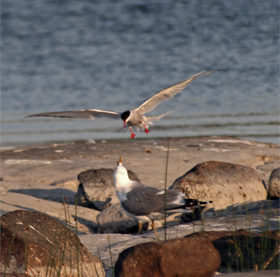Best practice manure handling
The report “Best Available Techniques for Manure Treatment” identifies available technologies to reduce nutrient leaching from industrial pig farms and analyze them regarding their environmental performance.
Separation technologies and anaerobic digestion are recommended as best available technologies based on their efficiency to reduce nutrient leaching and their cost efficiency. National policies for phosphorus management are suggested as an important measure to reduce discharge of phosphorus to waterways. Furthermore, the report discusses the strength of EU legislations to support the implementation of the recommended technologies.
The report is written by Henning Lyngsø Foged at the Danish Centre for Innovation for Bioenergy and Environmental Technology (CBMI), commissioned by Baltic Sea 2020. Baltic Sea 2020 invited experts and responsible authorities in the Baltic Sea Region to review the report and submit their comments.
The leaching of nutrient from intensive livestock farms to the Baltic Sea, has been identified e.g. by the Helsinki Commission as a major point source for eutrophication of the Baltic Sea. This project aimed to reduce the leaching, through technical development and spreading information on “Best Available Technologies” for cost efficient manure treatment. Focus is on pig manure at large industrial farms (>2000 slaughter pigs/750 sows).
Baltic Sea 2020 will promote the recommended technologies within the Baltic Sea catchment area. We hope that other organisations, institutes and authorities will find the report useful and will apply its findings, for example in the review process of the IPPC Directive and its reference documents, in agricultural advisory services, within the Baltic Sea Strategy and within the multiple ongoing projects aiming to develop intensive animal production within the Baltic Sea region in an environmentally sustainable way.
The report ”Best Available Techniques for Manure Treatment" has been translated into Lithuanian by the Lithuanian Environmental Protection Agency and published on their website. The report has been sent to Lithuania's Pork and Poultry Association and the Department of Agriculture.

Project status
PROJECT MATERIAL
2011-04-06 - Prospect
Turning pig manure from waste to asset
2010-09-29 - Proposal
Cost effective phosphorus management measures
2010-02-01 - Report
Best available technologies for manure treatment







